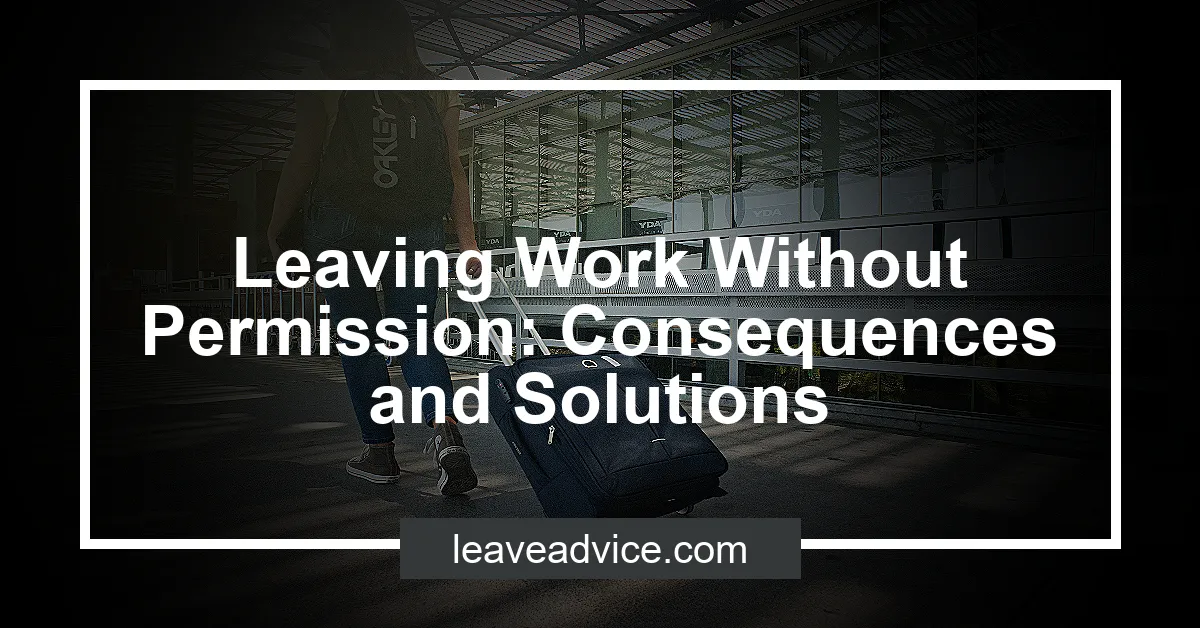Leaving Work Without Permission: Consequences and Solutions
Leaving work without permission can have serious consequences for both employees and employers. It can result in decreased productivity, damaged relationships, and even termination of employment.
In this article, we will explore the reasons why employees may leave work without permission and provide tips for employers on how to effectively manage this issue.
Check out this Youtube video: “leaving work place early without permission”. Whether you are an employer or employee, this informative video sheds light on the repercussions that can arise from leaving work without permission.
Consequences of Leaving Work Without Permission
1. Disciplinary Action
Leaving work without permission is a form of workplace misconduct that can result in disciplinary action. Employees who do so may receive verbal or written warnings, suspension, or even termination, especially if the behavior is consistent.
2. Loss of Pay
Employees who are absent from work without permission may lose pay for the hours they have missed. This can cause financial strain, especially if the absence was unplanned.
Additionally, they may forfeit any vacation or sick time they have accrued.
3. Damage to Team Morale
When employees leave work without permission, it can damage team morale by causing resentment and frustration among their coworkers. The remaining employees have to pick up the slack, which can lead to decreased productivity and increased stress levels.
4. Damage to Company Reputation
If employees frequently leave work without permission, it can damage the company’s reputation. This can make it difficult to attract potential employees and customers.
Additionally, repeated instances of AWOL can increase recruitment and training costs, leading to a reduction in company profit.
Supervising unauthorized departures of employees
Leaving work without permission can result in attendance issues, productivity loss, and ultimately, affect the company’s bottom line. Employers can take the following steps to manage employees who leave work without permission.
1. Set Clear Expectations
Employers must ensure that their company policies are clear and accessible to all employees. Employees must understand the company’s attendance policies and consequences of leaving work without permission.
Setting clear expectations and communicating them effectively can prevent such situations from occurring in the future.
2. Have an Open Door Policy
Creating a work environment where employees feel comfortable approaching their managers with concerns, including personal or family emergencies, can help prevent employees from leaving without permission. Employers can listen to employees’ concerns and work together to find solutions that meet the needs of both the employees and the organization.
3. Use Technology to Monitor Attendance
Employers can use time tracking apps, biometric attendance systems, or other technological tools to monitor employee attendance. Employers can detect when employees leave work without permission and identify patterns and issues that may result in frequent absenteeism.
Employers can then take corrective measures to address such issues.
4. Offer Flexibility Where Possible
Employers can offer flexible work schedules or telecommuting options to employees who may have personal or family emergencies that require them to leave work early. Employers can encourage their employees to maintain a healthy work-life balance, reduce absenteeism, and increase productivity.
In conclusion, managing employees who leave work without permission requires a proactive approach from employers. Employers must set clear expectations, communicate effectively, use technology to monitor attendance, and offer flexibility wherever possible.
By adopting these measures, employers can prevent absenteeism, improve productivity, and maintain a healthy work environment.
Frequently Asked Questions
Can an employer fire an employee for leaving work without permission?
Are there situations where an employee can leave work without permission?
What can employees do to avoid leaving work without permission?
Managing Employees Who Leave Work Without Permission
Leaving work without permission can have serious consequences for employees and employers alike. But how can employers best manage this issue?
Talk to Your Employees About It
If one of your employees leaves work early without permission, talk to them about it. Find out why they left and if there was a valid reason for doing so.
If not, explain that it is a clear act of misconduct that can result in disciplinary action.
Create a Plan and Policy
If employees are regularly leaving without permission, a plan and policy can be implemented. Ensure expectations are clearly stated and provide flexibility where possible.
Utilize technology to monitor attendance and enforce the policy consistently.
Explain the Consequences of Leaving Early
Make sure employees understand the consequences of leaving work without permission. This can include disciplinary action up to and including termination.
Give a Warning
If an employee is leaving work without permission, a warning may be necessary to alert them of the issue and how it needs to be resolved.

